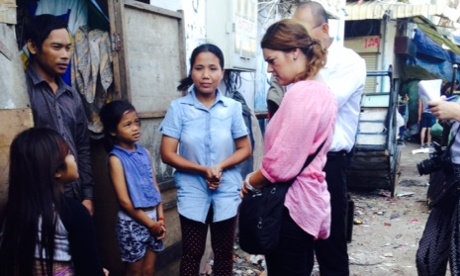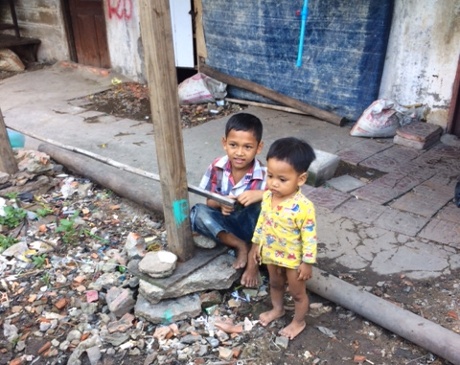Abbott's dirty deal with Cambodia will condemn refugees to destitution
The
Abbott government plans to send hundreds of refugees to Cambodia.
Ironically, many poor Cambodians are displaced refugees in their own
country

Sarah Hanson-Young / The Guardian |

Like many five-year-olds in Cambodia, Samang must work for a living.
He spends his days collecting drink cans from the rubbish dump that
doubles as his home and then takes them to his grandmother, who crushes
them with a brick. His grandmother does her best to care for him after
his mother left Cambodia to find work in Thailand because there are no
jobs in Phnom Penh. He is HIV positive.
I travelled to Cambodia to see what life will be like for the refugees the Abbott government plans to send there.
Ironically, Cambodians like Samang have become refugees in their own
country. Slum dwellers in the capital, Phnom Penh, have had their land
and homes grabbed from under them by developers, and are pushed out onto
the streets without any compensation.
Samang’s story is tragic, but it’s also common in a country that has
been destroyed by brutal civil war, poverty and decades of endemic
corruption. Human rights abuses are on the rise as the government cracks
down on those who challenge the corrupt justice system and public
services. Only last week, seven local mothers were jailed for a year for
peacefully protesting the government’s inaction over sewage that floods
their homes and children’s school on a regular basis.
Most of all, I fear for the young women and girls who Australia will send here. The sex trade is rife in Cambodia and young women are almost without protection. Orphanages in Cambodia are still full of young girls and boys, taken from poor homes with the promise of food and education, who are then exploited and sold for sex and labour. Clearly it is no place for Australia to be sending families who came to us asking for protection.
I met a young Rohingyan refugee named Tayab who has lived in Phnom
Penh for several years. He has no officially recognised residency or
citizenship and, therefore, none of the basic human rights that come
with it. He cannot travel, get a job or own a vehicle. He survives by
cooking roti every morning and selling it to passers-by on the street.
Without official identification papers, it’s the best he can do.
“There is no future for me here,” he told me as we sat in in his
cramped flat, “I want to leave but I can’t. Without papers, if I do
leave, I will have to do it illegally.”
After a long pause, he added: “This deal, with Australia, it is very bad luck for the refugees.”

The Cambodian and Australian governments have been tight-lipped
about the details of the refugee deal. At a farcical signing ceremony in
September, the media snapped photos of the immigration ministers
clinking champagne glasses but were ignored when they tried to ask
questions about the new arrangement. What we do know, largely from
Senate estimates questioning, is that refugees will be sent there by the
end of the year. Australia will pay $40m plus costs for the privilege
and, after a short time spent in the country’s capital, refugees will be
dumped in regional Cambodia and told to get on with their lives.
Regional Cambodia’s rice fields and stunning natural beauty are
interposed with scenes of stark destitution. The vast majority of
Cambodians work in low paying, unstable and informal jobs – and this is
especially true in the regions.
While visiting one of the villages in the rural province of
Battambang, I spoke to parents at the local school. The overwhelming
majority of them told me they had to travel to Thailand to work (often
illegally) to earn enough money to survive. Unless you already own land
and can grow rice, there are no jobs in the regional areas. What jobs
will the refugees Australia sends here actually be able to perform?
None, as far as I can see. There’s no work in Phnom Penh either – many
are likely to take the locals’ advice and head across the border, where
the wages are better.
Right now, there are 63 refugees
and 21 asylum seekers in Cambodia. That’s a mere 84 potential refugees
in the whole country. NGOs told me that they can’t care adequately for
even that small number. There are more than 1,200 asylum seekers on
Nauru, including families and children. All will be sent to Cambodia if
the Australian government gets its way. The Abbott government is willing
to pay to set this deal up, but the country clearly can’t cope with
such a significant influx of vulnerable people.
While the politicians in Canberra might have decided to condemn the
refugees on Nauru to a life of poverty and hardship, Australians deserve
to know about the realities of life in Cambodia. They need to know
about Tayab, poor young Samang and they need to know the truth: this
dirty deal with Cambodia will condemn hundreds of families to a life of
senseless and cruel destitution.
The Abbott government knows full well that it won’t be able to
support the refugees that it dumps in Cambodia. Alarmingly, it doesn’t
care.


No comments:
Post a Comment